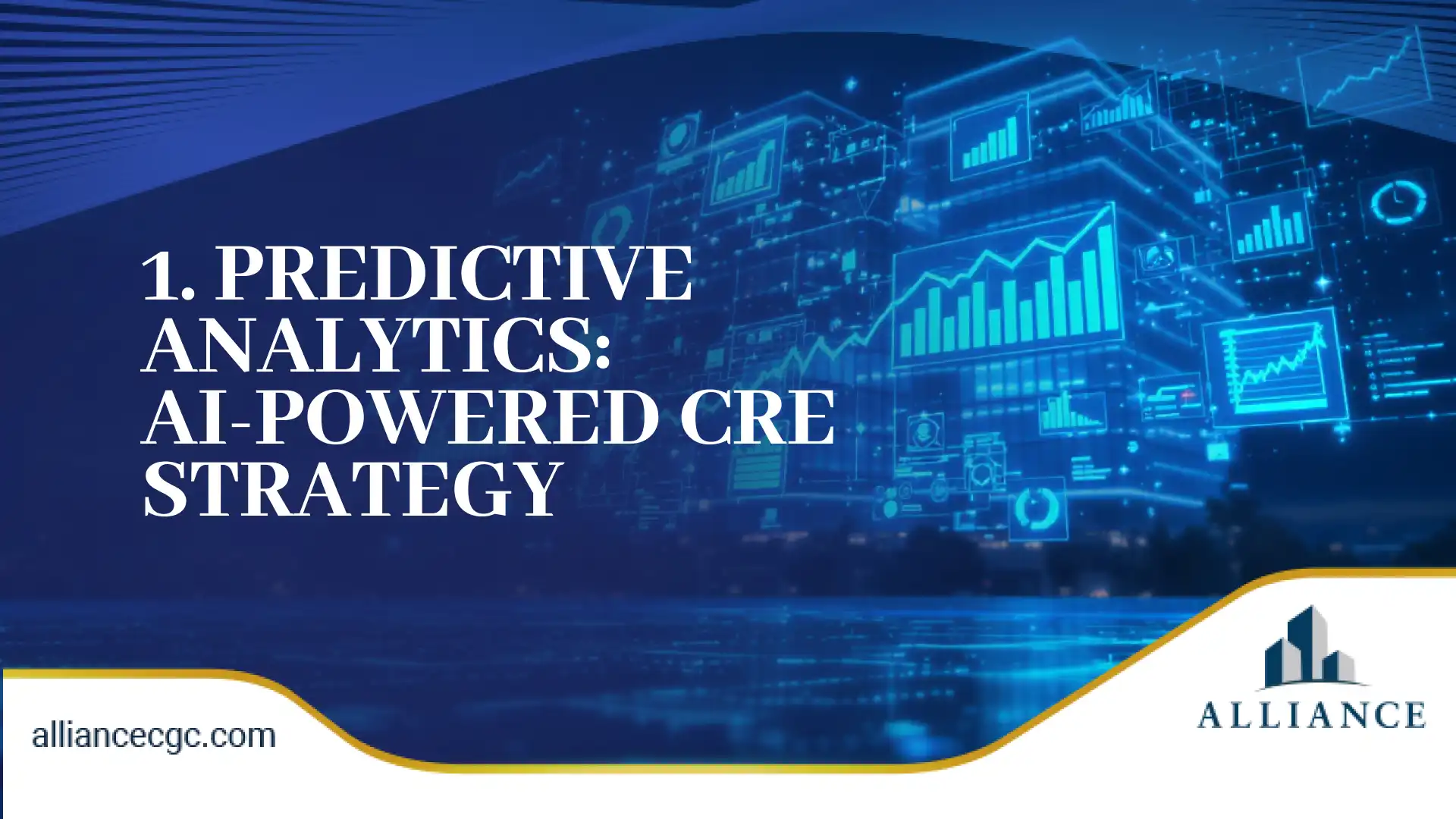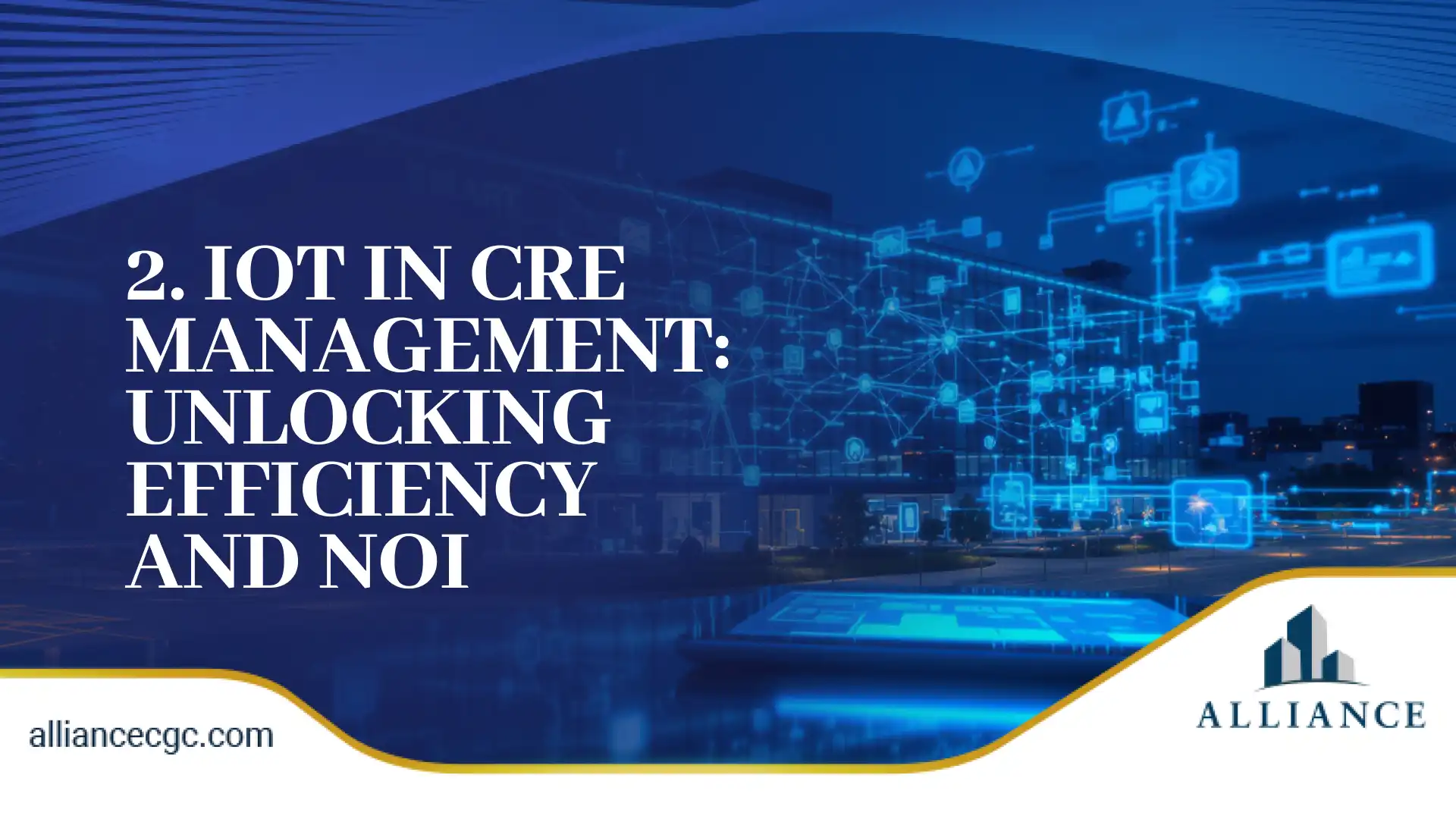3 Ways AI and IoT Are Transforming CRE Management in 2025
August 25, 2025

Artificial intelligence (AI) and the Internet of Things (IoT) have moved from experimental tools to core drivers of commercial real estate (CRE) management. By 2025, portfolios adopting these technologies are gaining a measurable edge, cutting operating expenses, boosting tenant retention and protecting asset valuations against volatility.
As capital markets prioritize data-driven acquisitions, environmental, social and governance (ESG) compliance and operational efficiency, AI and IoT have shifted from optional upgrades to essential elements of a resilient CRE strategy. They are no longer just enhancing property operations; they are redefining how net operating income (NOI) is maximized, risks are managed and assets are positioned for sustainable long-term growth.
Many portfolios still rely on outdated practices. Rising operating expenses (OpEx) cut into returns. Tenant churn weakens occupancy. Compliance demands outpace manual processes. Reliance on backward-looking comps leaves investors exposed to mispricing and liquidity gaps. Without intelligent automation, these challenges steadily erode NOI and weaken asset performance.
Deloitte’s 2025 Commercial Real Estate Outlook indicates that over 60% of institutional investors are factoring technology adoption into asset selection, highlighting efficiency, tenant experience and ESG reporting as key drivers.
In 2025, portfolios that leverage AI and IoT are positioned to achieve stronger NOI growth, risk-adjusted performance and long-term equity resilience. The following insights show how these technologies are reshaping CRE management into a source of competitive returns.
1. Predictive Analytics: AI-Powered CRE Strategy

AI-powered predictive analytics are reshaping how commercial real estate portfolios are underwritten and managed. Instead of depending on static pro formats or backward-looking comparables, investors now apply machine learning to model tenant retention, rent trajectory, absorption velocity and market volatility with greater accuracy.
This level of foresight gives disciplined portfolios a measurable edge. Investors can identify mispriced assets before valuations adjust, quantify risk-adjusted returns across multiple economic scenarios and prioritize acquisitions that are well-positioned for sustainable NOI growth. Predictive analytics also empower counter-cyclical strategies, allowing capital to flow into undervalued assets while competitors hesitate and avoid the trap of overpaying in overheated markets.
For investors focused on resilient income streams and long-term equity growth, AI-driven forecasting transforms behavioral biases into opportunity, ensuring acquisitions are aligned with both current fundamentals and future demand drivers.
2. IoT in CRE Management: Unlocking Efficiency and NOI

Growth
The IoT is transforming CRE operations through sensor-driven building intelligence. Integrated systems now monitor heating, ventilation and air conditioning (HVAC) efficiency; lighting demand; and real-time occupancy, enabling operators to minimize energy leakage, schedule predictive maintenance and optimize load management.
For investors, the financial outcomes are clear:
- Lower OpEx flows directly into higher NOI
- Improved reliability strengthens tenant retention and accelerates lease-up velocity
- IoT-enabled monitoring supports compliance with carbon disclosure standards, Leadership in Energy and Environmental Design (LEED) certification and ESG reporting frameworks increasingly tied to capital flows
Together, AI and IoT form the foundation of real-time risk management, turning operational efficiency into long-term portfolio resilience.
By 2025, IoT adoption will have become a determinant of asset competitiveness. Properties with integrated building intelligence achieve valuation premiums, favorable debt terms and stronger liquidity positioning while nonequipped assets risk obsolescence in both tenant and capital markets.
3. AI & IoT in Risk Management and ESG

Risk in CRE extends beyond market cycles. Operational blind spots, unmonitored lease covenants, regulatory demands and tenant credit exposure all pose threats to portfolio stability. AI and IoT are now critical in mitigating these vulnerabilities before they impact cash flow.
AI-driven lease management systems track renewal deadlines, escalation clauses and compliance obligations in real time, reducing missed opportunities and revenue leakage. IoT-enabled monitoring networks strengthen life-safety systems, reduce liability exposure and generate the granular data required for ESG disclosure, carbon accounting and sustainability certification. Meanwhile, predictive algorithms stress-test refinancing timelines and market volatility, enabling investors to restructure debt positions and preserve liquidity before disruptions escalate.
Portfolios equipped with AI- and IoT-enabled oversight operate as real-time risk management platforms. This integration safeguards income streams, ensures regulatory alignment and supports long-term asset resilience even in periods of heightened market uncertainty.
How CRE Leaders Turn AI & IoT Into Strategic Advantage
AI and IoT are opening new opportunities in commercial real estate, turning data and automation into tools for stronger portfolios. Investors who embrace predictive analytics, IoT-enabled intelligence and AI-driven compliance are seeing the benefits firsthand: higher NOI, stronger tenant relationships and asset valuations that continue to grow.
Alliance is a trusted partner in CRE innovation, with a firm that not only boasts a track record but also blends decades of experience with forward-looking strategies that turn technology into durable returns. With a $500M+ portfolio, 30+ years of expertise, a 28% historical internal rate of return (IRR) and a 2.5x average equity multiple, Alliance has consistently delivered stability and long-term growth through net-leased medical, retail, industrial and office properties ranging from $1M to $25M.
Become an investor and turn tech transformation into portfolio performance.
Frequently Asked Questions (FAQs)
How is technology changing commercial real estate?
Technology is transforming commercial real estate by enabling predictive analytics, IoT-driven building intelligence and automated compliance tools. These innovations cut OpEx, improve tenant retention and strengthen NOI growth and asset valuations, delivering lasting portfolio resilience, sustained competitiveness and long-term value creation.
How to use AI in commercial real estate?
AI in commercial real estate is applied through predictive analytics, lease management automation and risk modeling. Investors use it to forecast rent growth, assess tenant churn, detect mispriced assets and stress-test refinancing risk, ensuring acquisitions and portfolios deliver sustainable, risk-adjusted returns.
How to increase smart building efficiency?
Smart building efficiency improves with IoT-enabled systems that monitor HVAC, lighting and occupancy in real time. These systems reduce energy waste, enable predictive maintenance and optimize load management, cutting OpEx, supporting ESG compliance and boosting long-term NOI.
What does ESG stand for in real estate?
In real estate, ESG stands for environmental, social and governance. In CRE, ESG emphasizes energy efficiency, carbon reporting, tenant well-being and transparent compliance. Properties aligned with ESG standards attract more capital, achieve valuation premiums and deliver long-term resilience.










